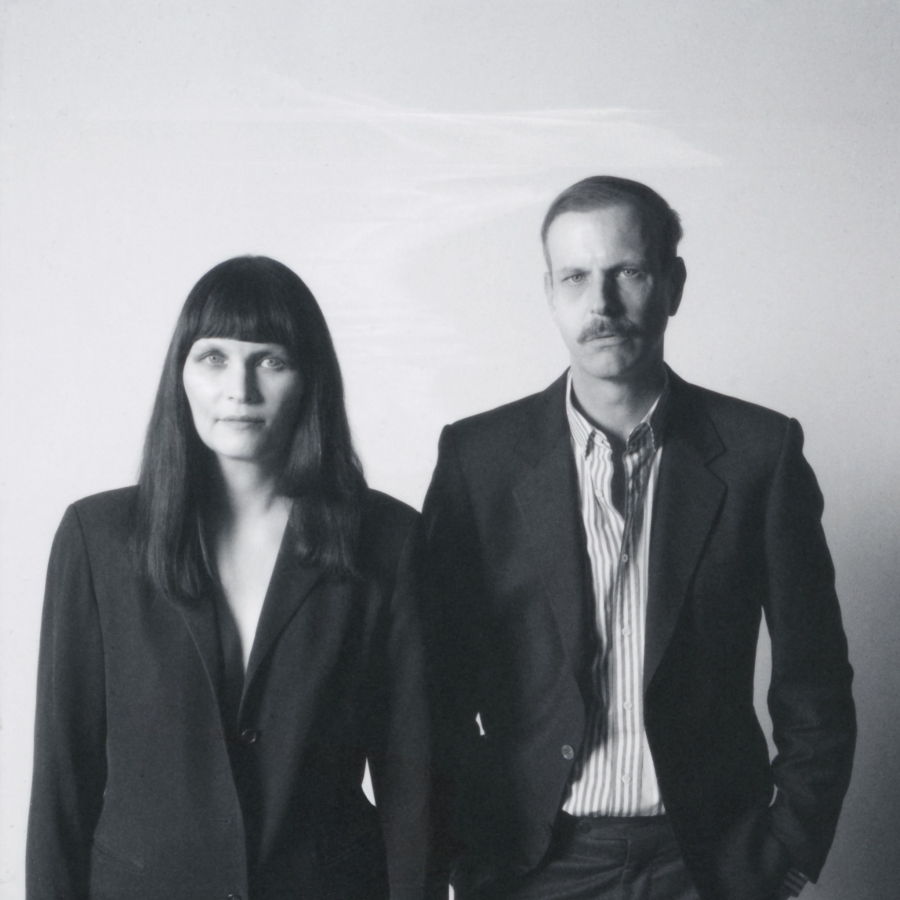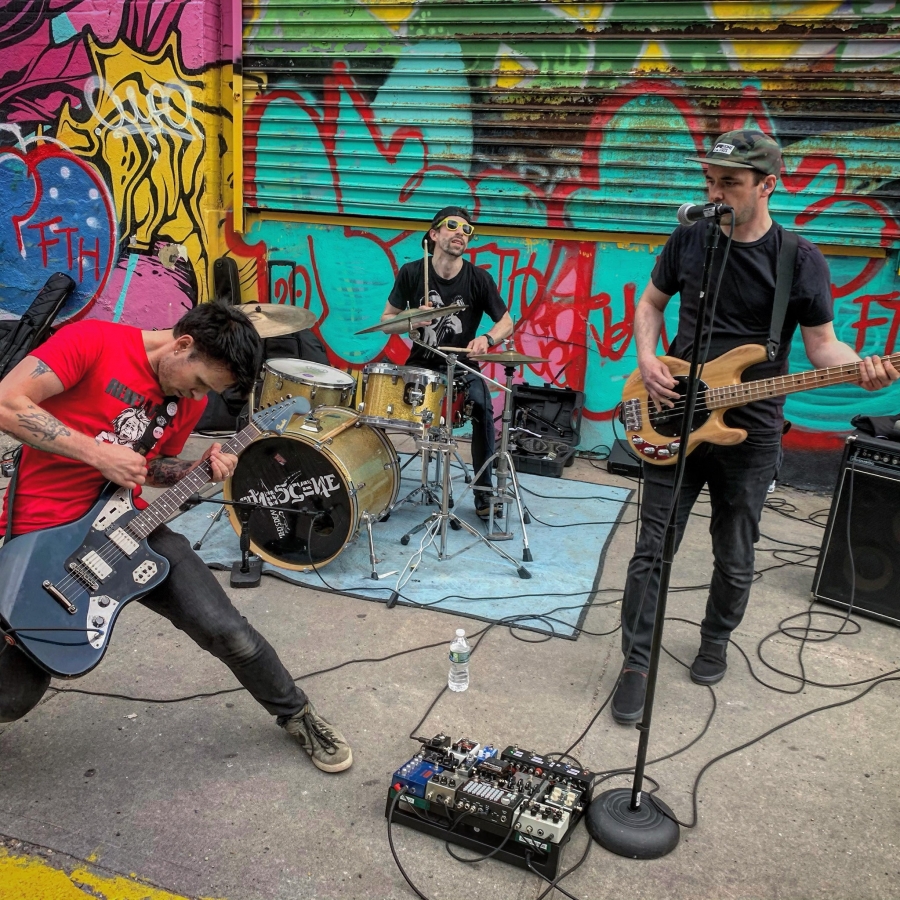Months previous to the release of her debut full-length Chain Reaction (Born Losers Records), the first time I heard Catherine Moan’s music was with the song “Drop It!” whose refrain goes: “sway in time, it’s so sweet / drop down low and feel the heat / keep it down low / drop it, drop it feel the heat / drop it feel the heat, drop it feel the heat / drop it, drop it, drop it, drop it / drop it feel the heat” and I was immediately struck by how Ms. Moan had taken the sentiment behind Snoop Dogg’s “Drop It Like It’s Hot” (due credit to Lil’ Wayne) and removed both the simile and the spare, ultra-vivid production work—replacing it instead with a neon smear of pulsing analog synths and 80s-esque drum programming (“new retro wave” the kids call it) with the requested acts of “drop[ping] it” and “feel[ing] the heat” (not to mention “keep[ing] this fire burning / ’til the records stop turning”) framed as invitations rather than commands, supported by a bopping electro-lullaby vibe with the song’s only hint of conflict coming in the bridge: “now that we can finally breathe / c’mon and drop that ass / and dance with me.
It was the perfect summer jam and needless to say I was hooked, especially after witnessing the music video which simulates the feel of an ‘80s video dating profile. But then something funny happened. The more I listened, the more I detected a ghostly undertow to the song. Maybe it was the icy pinprick synths in the chorus. Or the airy dissociated-sounding vocals, like being seduced by someone when under ether (hello, Andrea True Connection!) or how the musical arrangement feels like John Carpenter wrote a major-key disco song for one of his soundtracks.
But far from detracting from the song this only deepened my appreciation because, for my money, it’s just this distinctively different kind of tension that makes “Drop It!” and the album it appears on now so oddly alluring—because over seven subsequent tracks Chain Reaction doubles down on the mood-altering mashup of ecstatic release and confining unease and emotional blunting a.k.a. “waning of affect” if you wanna get all postmodern about it (on the latter point, one song on the album revolves around the repeated phrase “I can’t feel a thing” while the chorus of another informs the listener “I want to feel nothing / I want to see nothing”).
And not that you asked but when it comes to cinematic associations evoked by Chain Reaction for me it’s Ridley Scott’s Blade Runner all the way. Because imho all these songs would fit perfectly at a Los Angeles discotheque and lounge circa 2019 as imagined in 1982 (natch!) perfectly capturing the retro-future sound of pop music in a society overtaken by rampant technology, alienation, and environmental degradation (but also, new methods of connection and new avenues of pleasure, so call it a draw!) which leads its citizenry to question what it even means to be “human” anymore (who could imagine such a place!) and where pop music serves both as a crucial mirror-to-society and escapist release (like how Harrison Ford reportedly loved singing “More, More, More” in his downtime). And then seeing Ms. Moan perform her first NYC live show on a rooftop on the first night that Tropical Storm Elsa brought torrential rains to the city (the Our Wicked Lady roof is covered, but still I’m surprised and impressed the show went on) really sealed the deal.
Plus on “Drop It!” in particular I get the feeling Ms. Moan is actually role-playing as a “basic pleasure model” replicant-as-pop-artist à la Daryl Hannah’s Pris character (who shoulda been in a goth band in the movie with her perfect punky raccoon look, or maybe they cut those scenes out) but a basic pleasure model who will gladly crush your windpipe between her thighs when the time’s right—plus you gotta admit “feel the beat / in your heartbeat” is a brilliantly cyborg-y song lyric but hey what do I know—while the other songs on Chain Reaction likewise bring to mind a distinctly “glowing neon signs reflecting off glass surfaces and slicked concrete streets of an urban dis/pleasure district”, with the next track “Wasted” upping the moody-pop stakes with a faded-in intro that could easily be a Vangelis outtake from the Blade Runner soundtrack.
To which you may rightly say: “Theories, schmeries! What does Catherine herself say about the record, her creative process and sources of inspiration?” Well, lucky for you, I asked and she answered, generously filling in some of the details and, no, Blade Runner was never mentioned. Ms. Moan describes her creative process thusly:
“I write and record off of feelings and whims. Rather than going into a song with a planned idea it usually starts from a melody or lyric I hummed and came up with in the shower or on a walk. And from there it is a playful and chaotic binge of making all kinds of arrangements of sounds and melodies. I’ll sit there with my microphone and sing/speak/shout all kinds of quips and lines in different rhythms and styles until something clicks and it all falls into place. And this process goes on until I can’t stop dancing around my room until i’m out of breath. It’s a style of creativity that I feel is very true to my hyperactive and energetic personality…there’s something about spontaneity and randomness that I think can really bring ideas out of thin air and really tap into where I am at the moment.”
And ok none of this sounds very cyborg-like but instead more human than human which hey that’s a good thing and I’m just picturing this process unfolding with a song like “Body Work” as it builds from a reflective electro-ballad (“I get overwhelmed from the start”) to a bedroom-dancing-crescendo during the chorus (“I can’t feel a thing / ‘cause I’m over it all”) which all taps into one overarching theme of the album described by Catherine as “coping with an unnatural amount of alone time with yourself and your body and specifically the places my own mind went from being beside myself too long” which is all pretty damn relatable given the recent past.
But when it comes to the creative tools she used to make the album I’m on slightly firmer ground given that the songs on Chain Reaction were created using a “tight selection of gear…using a KORG Minilogue, my pink Fender Mustang, a humble Shure SM58, and a handful of VSTs” and judging from a couple demo videos I viewed on the Minilogue it’s especially good at producing the ethereal, shimmering timbres favored by Vangelis and the Yamama CS-80 used on the Blade Runner soundtrack so there ya go.
Moving from keyboard patches to skin grafts, on “Skin Graft” Ms. Moan elaborates her Cartesian thematics further on a song she describes as being “about [my own] frequent hospital visits and health issues” plus “reacting to a permanent scar I had just acquired on my chin from falling HARD off my skateboard,” but that also comes from “the perspective of elective surgeries people go through with to alter their appearance or ‘fix’ parts of their bodies they don’t agree with.”
“The lyrics ‘scars on my face / stitches cut across / take them away…bind them down’ is a reflection on gender identity and a disassociation and conflict between secondary sex characteristics and androgyny. And more specifically the compulsion to want to change those things to find comfort albeit through drastic, painful, medical procedures like breast reduction [or] full on top surgery [whereas] the chorus ‘I want to feel nothing I want to see nothing’ is very self explanatory…an honest and blunt vocalization of the conflict and the wish to cease and desist any self hatred / body confusion” which raises an interesting if accidental parallel between the song and the movie because they both revolve around being in a state of ontological crisis—a crisis provoked when long-standing, dominant binaries (male/female, human/non-human) are violated and thus challenged which is a brave but risky thing to do—though at least this state of crisis is set to a catchy disco beat which makes for the best kind of crisis.
It’s all enough to make you wanna switch your mind and body onto autopilot (another running theme on the album!) which is addressed head-on in the album’s penultimate track “Lucky Lobotomy” (“Turn myself into the cerebral authorities. Lock me out, toss the key”) which is about how “all the privilege and agency that comes with having a sentient mind can be overwhelming because your thoughts will just go to such unhealthy and painful places that wind up hurting you and god forbid others. But luckily it’s a lovely track so you’re unlikely to suffer any permanent damage.
In closing I’d say that Catherine Moan’s I-wanna-be-sedated-synth-pop bangers on Chain Reaction are perfect for turning off your mind and floating downstream (despite some heavy, heady ideas as inspiration) or for dancing madly in the middle of the street not giving a damn what anyone thinks because all these moments will be lost in time, like tears in rain. (Jason Lee)











